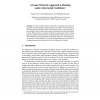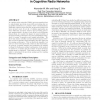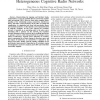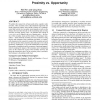68 search results - page 8 / 14 » Game theory for cognitive radio networks: An overview |
IFIPTCS
2010
13 years 5 months ago
2010
Abstract. We present a game-theoretic framework for modeling and solving routing problems in dynamically changing networks. The model covers the aspects of reactivity and non-termi...
MOBICOM
2009
ACM
14 years 1 months ago
2009
ACM
In cognitive radio networks (CRNs), spectrum sensing is key to opportunistic spectrum access while preventing any unacceptable interference to primary users’ communications. Alt...
GLOBECOM
2010
IEEE
13 years 4 months ago
2010
IEEE
Abstract--Characterizing the topology and therefore fundamental limits is a must to establish effective end-to-end cognitive radio networking (CRN). However, there lacks complete u...
MOBICOM
2009
ACM
14 years 1 months ago
2009
ACM
We address the connectivity of large-scale ad hoc cognitive radio networks, where secondary users exploit channels temporarily and locally unused by primary users and the existenc...
CN
2006
13 years 7 months ago
2006
Today's wireless networks are characterized by a fixed spectrum assignment policy. However, a large portion of the assigned spectrum is used sporadically and geographical var...




